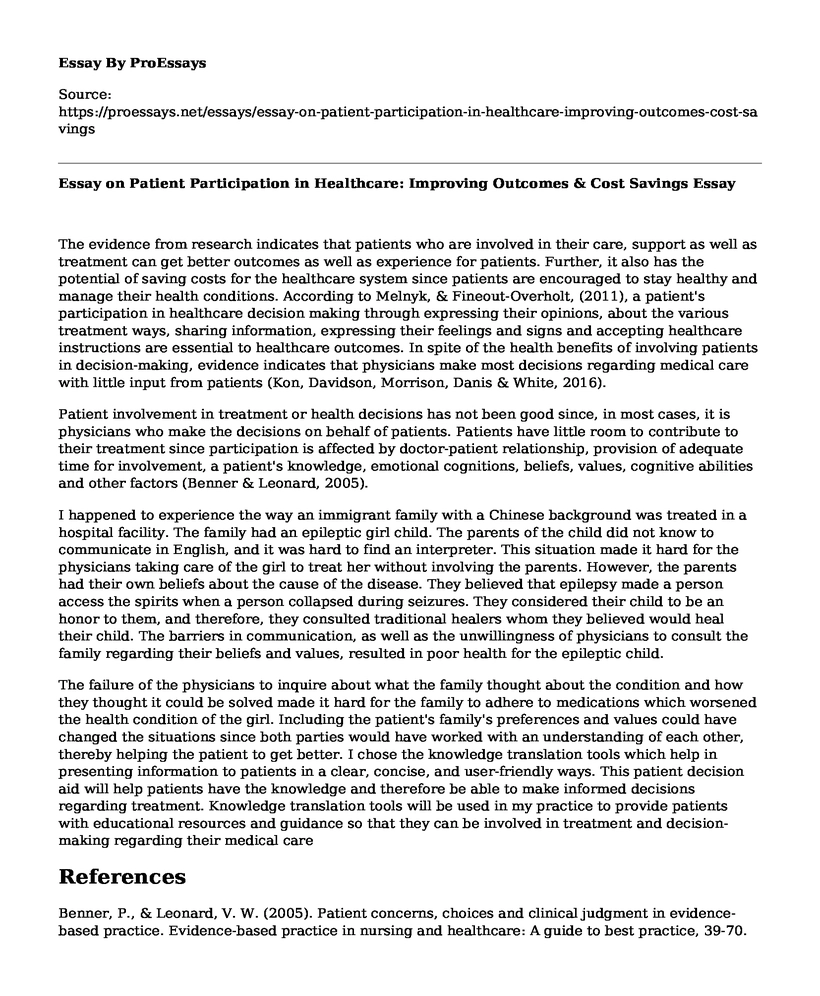The evidence from research indicates that patients who are involved in their care, support as well as treatment can get better outcomes as well as experience for patients. Further, it also has the potential of saving costs for the healthcare system since patients are encouraged to stay healthy and manage their health conditions. According to Melnyk, & Fineout-Overholt, (2011), a patient's participation in healthcare decision making through expressing their opinions, about the various treatment ways, sharing information, expressing their feelings and signs and accepting healthcare instructions are essential to healthcare outcomes. In spite of the health benefits of involving patients in decision-making, evidence indicates that physicians make most decisions regarding medical care with little input from patients (Kon, Davidson, Morrison, Danis & White, 2016).
Patient involvement in treatment or health decisions has not been good since, in most cases, it is physicians who make the decisions on behalf of patients. Patients have little room to contribute to their treatment since participation is affected by doctor-patient relationship, provision of adequate time for involvement, a patient's knowledge, emotional cognitions, beliefs, values, cognitive abilities and other factors (Benner & Leonard, 2005).
I happened to experience the way an immigrant family with a Chinese background was treated in a hospital facility. The family had an epileptic girl child. The parents of the child did not know to communicate in English, and it was hard to find an interpreter. This situation made it hard for the physicians taking care of the girl to treat her without involving the parents. However, the parents had their own beliefs about the cause of the disease. They believed that epilepsy made a person access the spirits when a person collapsed during seizures. They considered their child to be an honor to them, and therefore, they consulted traditional healers whom they believed would heal their child. The barriers in communication, as well as the unwillingness of physicians to consult the family regarding their beliefs and values, resulted in poor health for the epileptic child.
The failure of the physicians to inquire about what the family thought about the condition and how they thought it could be solved made it hard for the family to adhere to medications which worsened the health condition of the girl. Including the patient's family's preferences and values could have changed the situations since both parties would have worked with an understanding of each other, thereby helping the patient to get better. I chose the knowledge translation tools which help in presenting information to patients in a clear, concise, and user-friendly ways. This patient decision aid will help patients have the knowledge and therefore be able to make informed decisions regarding treatment. Knowledge translation tools will be used in my practice to provide patients with educational resources and guidance so that they can be involved in treatment and decision-making regarding their medical care
References
Benner, P., & Leonard, V. W. (2005). Patient concerns, choices and clinical judgment in evidence-based practice. Evidence-based practice in nursing and healthcare: A guide to best practice, 39-70.
Kon, A. A., Davidson, J. E., Morrison, W., Danis, M., & White, D. B. (2016). Shared decision making in intensive care units: an American College of Critical Care Medicine and American Thoracic Society policy statement. Critical care medicine, 44(1), 188.
Melnyk, B. M., & Fineout-Overholt, E. (Eds.). (2011). Evidence-based practice in nursing & healthcare: A guide to best practice. Lippincott Williams & Wilkins.
Cite this page
Essay on Patient Participation in Healthcare: Improving Outcomes & Cost Savings. (2023, Jan 29). Retrieved from https://proessays.net/essays/essay-on-patient-participation-in-healthcare-improving-outcomes-cost-savings
If you are the original author of this essay and no longer wish to have it published on the ProEssays website, please click below to request its removal:
- Essay Example on Evaluating Costing and Value Chain for Optimal Org Growth
- Research Paper on Hip Hop Culture and Its Influence on Black Community and American Politics
- Research Paper on Smoking in Houston: Evidence-Based Interventions and Health Risks
- Leadership: My Personal History and Journey
- Fetal Alcohol Syndrome: The Risks of Drinking During Pregnancy - Essay Sample
- Essay on Ducati: Management Change Led to Successful Ten-Year Journey
- Online Therapy: A Growing Form of Telehealth - Essay Sample







